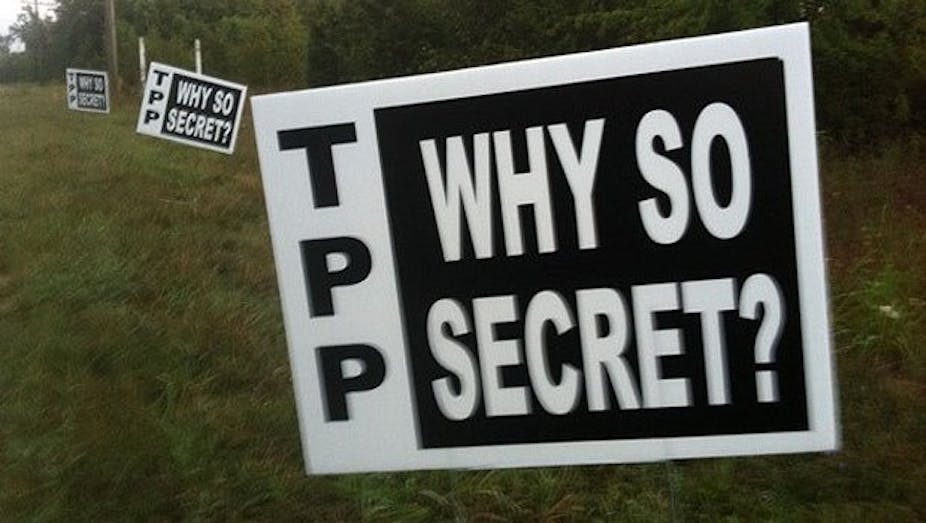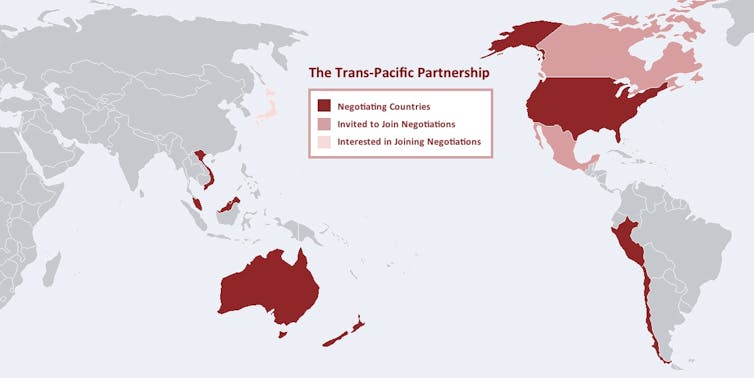
Jane Kelsey ne travaille pas, ne conseille pas, ne possède pas de parts, ne reçoit pas de fonds d'une organisation qui pourrait tirer profit de cet article, et n'a déclaré aucune autre affiliation que son organisme de recherche.
University of Auckland apporte un financement en tant que membre adhérent de The Conversation AU.
University of Auckland, Waipapa Taumata Rau apporte un financement en tant que membre adhérent de The Conversation NZ.
Voir les partenaires de The Conversation France

The secretive Trans-Pacific Partnership Agreement, a free trade agreement being hammered out between twelve countries, has received another broadside from Wikileaks. The third leak in three months, this was the draft environmental chapter and a report showing the positions on the chapter of the twelve member countries – Australia, Brunei, Chile, Canada, Japan, Malaysia, Mexico, New Zealand, Peru, Singapore, the US, and Vietnam.
The latest leak is significant for three reasons. First, the fact that someone or some member country inside the process has leaked yet another chapter shows there are some very unhappy campers holed up in these negotiations. Pressure is clearly being applied to countries that feel they need outside voices to help them hold the line. That pressure continues to intensify, making further leaks likely.
These documents, dated 24 November 2013, the last day of the Salt Lake City round that preceded the December meeting of TPP ministers in Singapore, gives some insight into how ministers are trying to break the deadlock in key areas.
Asking one country, in this case the Canadian chair of the environment working group, to prepare a new text themselves to present to the rest is a controversial strategy used at the World Trade Organisation to isolate countries that are holding outlier positions, even ones that are critically important for them. They can be treated as obstructive if they insist on holding the line, unless they are sufficiently powerful to get their own way when it comes to the political trade-offs.
Second, the text is weak – hardly the 21st century standard-setter TPP cheerleaders have been claiming. The environmental provisions in this document address a wide range of issues from overfishing, shark-finning and protecting endangered species, to recognising indigenous rights over traditional knowledge and genetic resources. Most of the provisions are aspirational and it has no teeth to enforce what limited obligations there are.
I have mixed feelings about that. The core chapters of these agreements, especially on investment, agriculture, intellectual property and services, impose pro-corporate rules on governments and communities. Those rules are toxic to biodiversity, ecosystems, indigenous knowledge and resources, human and animal health, water, forests fish and other natural resources, and other aspects of conservation and the environment.
And those rules are certainly enforceable, in the case of investments both by states and through the notorious investor-state dispute settlement processes . The secrecy of the cases, inconsistent, usually pro-investor interpretations, conflicts of interests of many arbitrators, and excessive awards of compensation, including compound interest, are just some of the grievances. The vast majority of investor-state disputes involve government measures to regulate natural resources or to protect the environment or public health.

Environment chapters are often mere fig leaves, used to deflect criticisms. So it’s no surprise that the TPP’s environment chapter is weak, lacking measures for enforcement or dispute. They are not meant to act as an antidote. So the leaked chapter confirms our expectations that the “gold standard” rules are only for the corporations, not to protect people and the planet. But if the agreement does happen, a strong chapter could be important.
That leads to the third and most significant point from the leaks. The chair’s commentary shows the US is the outlier on most of the disputed provisions. That includes articles that refer explicitly or by implication to international agreements it has not signed, such as the Kyoto Protocol, the Convention on Biological Diversity and the UN Declaration on the Rights of Indigenous Peoples.
But the most important outlier is the refusal of all the other governments to agree that even these weak obligations should be enforceable by trade sanctions under the dispute mechanisms that apply to the agreement as a whole. Instead, they have proposed a mixture of consultations, political discussions, and arbitration that leads to a conclusion about a breach and an action plan – but nothing to enforce it.
Back in May 2007 President George W Bush did a deal with the Democrat-controlled Congress. Its terms included what must be in the environment chapter of any US free trade agreement. Those requirements include the enforceability of the chapter by imposing trade sanctions for governments found to have breached their obligations. The US has required that in all subsequent free trade pacts. But this leaked text falls far short of the May 2007 standards in many ways, and especially on sanctions.
This poses a dilemma for the Obama administration. On 9 January a bill was tabled in both houses of Congress seeking fast track negotiating authority for the TPP and other agreements. Fast track would require Democrats and Republicans to accept or reject a final text as a whole, within a specified time. Obama is already struggling for support. This environment chapter will strengthen opposition from some Democrats and force Obama to rely even more on hostile Republicans. Even with fast track, a TPP with an unenforceable environment chapter would be very hard to pass.
As if to herald such a showdown, US Trade Representative Michael Froman made clear in response to the leak, that “we will insist on a robust, fully enforceable environment chapter in the TPP or we will not come to agreement”.
It is hard to imagine the environment chapter being the break point for the TPP. The US will play hardball. The current bet is on a trade-off that accepts enforcement of an incredibly weak chapter, making the concession largely meaningless. But the leaked chapter will show that the other eleven countries have caved to US demands, an association they may soon regret.